
Headmaster's Reflections
Headmaster
Dr Alec O'Connell

Headmaster
Dr Alec O'Connell
Dear Community
I aim to keep this note as COVID-19 free as possible given the amount of communication we are all dealing with. All I want to say is thank you for your support and understanding. We very much appreciate the way families are responding to our requests. Please be assured that our COVID-19 Response Team, chaired by myself, is keeping abreast of changes and, more importantly, are trying to respond in a calm and measured manner. Just to reiterate that any changes or information pertaining to Scotch College, will only be confirmed via my office.
Fortunately, before we had other instructions, last Thursday we were able to share in what was an amazing PSA swimming carnival. Our boys were simply outstanding in achieving 3rd place and finished very close to Hale who took out second. Congratulations to CCGS on their well-deserved victory.
Thanks must go to Mr Ryan Steenkamp, our new Head of Swimming, the other coaches, parents, and of course the amazing group of boys who performed out of their skin on the night. Well done everyone.
At times like these it is easy to forget that our focus remains on teaching, pastoral care and ensuring our boys get a great experience. Our sub schools continue to be engaged in a myriad of curriculum and curricular activities. We are not far away from taking over the new Mathematics and Business building which will certainly add to our educational focus and programmes. Last week I went through the building, and with the addition of the furniture it is simply amazing. I look forward to all of you being able to see what we have achieved with the goal of providing our boys with a set of world class facilities.
As you are no doubt aware, the College has a significant role within the Round Square group of schools. The College has recently been selected as one of 12 Round Square schools to take part in a research project in conjunction with Education University Hong Kong. The project is focused on leadership and what it looks like in different parts of the world, the sort of thing the organisation is perfectly set up to do. This is part of a wider effort by Round Square to conduct research projects into areas the organisation particularly promotes and values. The first project, undertaken and released last year, focused on global competency, and can be found at the link below.
https://www.roundsquare.org/being-round-square/what/ideals/internationalism/research/
The next few months will no doubt hold some experiences that we were not particularly planning for at the start of 2020. One of our great strengths has always been our ability to respond and adapt to whatever situation lies ahead.
Again, thank you all for your support over the last few weeks and no doubt the coming months in an ever-changing landscape.
Dr A J O'Connell
Headmaster
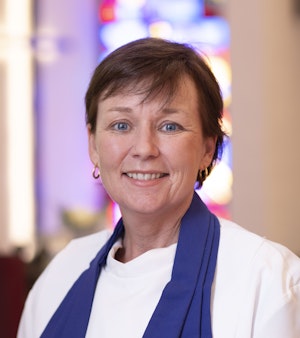
Revd Justine Wall
Chaplain
"Dogs are like that, I guess, they know how to fix you without ever saying a word."
Duffy Wall is an unofficial member of the Scotch College staff. That is to say, he comes to work with his owner, Reverend Justine, every Tuesday and accompanies her to classrooms, playground duty, pastoral care visits and even chapel services. He is an important part of the Junior School wellbeing team. As the six-year-old, mini Labradoodle makes his way through the reception area or across a sports' field, boys of all ages rush to greet him. They call out his name, pat him as he walks past and shuffles to sit next to him on the steps.
You don't need to explain the benefits of having a dog around to most children. A dog doesn't ask if you've done your homework or why you are sitting alone. He doesn't care that you not good at some things or not popular with some people. Duffy greets everyone equally and will sit with anyone. He's an unconditional friend and sometimes that's just what's needed.
Duffy doesn't have any formal qualifications and he hasn't been specially trained as a therapy dog. However, he has been assessed by veterinary behaviour consultant, Dr Nicole Lobry de Bruyn at Murdoch University and certified to be of suitable temperament to be in a workplace and with children. Because of his small size and woolly coat, he doesn't intimidate small children or trigger allergies. Duffy has even won over one or two boys who in the past have had negative experiences with dogs.
For his part, Duffy loves coming to Scotch. He enjoys the attention and the exercise he gets going for walks with boys and having them throw the ball for him. After a busy recess or lunchtime, he loves to sit with boys reading in the Library. The Library staff fuss over him and bring him water to drink, while boys stroke him to sleep under a table. It's hard work being a comfort dog but Duffy wouldn't have it any other way.
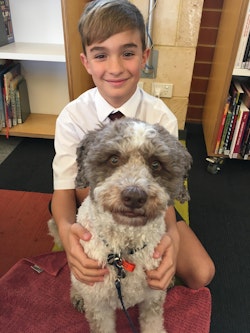
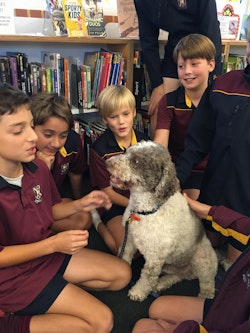

Mrs Cara Fugill
Director of Teaching and Learning
Considering the events of the past month, it is realistic to imagine that working from home could suddenly be mandated for an entire workforce. This begs the question, are we ready for such a change or does it mean that businesses, education and social interaction will be significantly compromised? There is no doubt it will be disrupted, but whether we can still maintain a similar standard of living remains to be seen. History tells us that humans have the capacity to adapt and evolve in a very short period of time but is this change too significant to achieve in such a small window?
This concept of forced change has given me the opportunity to think about how Scotch would deliver curriculum remotely and, to be honest, the ease at which the plan came together is somewhat comforting. Scotch has for a long time, been well prepared to deliver curriculum online and I am confident our staff have the skills to do this tomorrow. Examples of what we already do on a day-to-day basis means remote education, like universities, are a reality for schools and can be achieved even down to our younger years.
We have a long list of online capabilities;
What seems to be missing is the social interaction that makes communication quick and easy. In a classroom, teachers have the ability to address issues with conceptual understanding in an efficient manner whilst also supervising behaviour, monitoring work completion and building a positive rapport that makes learning engaging for students. Can we simulate this same environment whilst in isolation and working from home?
Over the past four days, our entire staff have received professional development on the protocol to follow in the event of school closure and the use of specific collaborative technology that would promote better delivery of curriculum online. In the Senior, Middle and Year 5 cohorts, Microsoft Teams will be used in conjunction with SEQTA learn to create classes where students can collaborate in real time, post questions, access resources and conference call from home. It's user friendly, and in a short time frame both staff and students have become comfortable with its features. In Junior School, Showbie will continue to be the way in which teachers share the learning with students and parents.
The other aspect of considering school closure is making sure that everyone is aware of exactly what to do at short notice. Having consistency across classes and year groups means that operations can be managed by staff and easily followed by students and parents. It would be expected that the boys start the school day dressed into their sports uniform ready to attend their first online class by 8:50 am. However, being online for 6 hours a day wouldn't be an effective learning environment, nor a particularly healthy one either. In the event of school closure, boys would only be expected to attend lessons online periods 1 through to 4, using periods 5 and 6 to work independently on the set work. Each timetabled period would begin by opening up their class on Teams to register their attendance. This allows the teacher to record who is present on SEQTA so that usual protocol for notifying parents of absence can occur. Following this, the teacher can instruct students on how the learning will proceed, with the teacher remaining online to answer any questions and provide support for the duration of the lesson. Boys can continue to post questions later in the day; however, the teacher may not reply immediately since they have other classes, or they are working to create resources. To ensure accountability, students would be expected to upload their weekly work to SEQTA, so teachers are able to monitor progress and let parents know if their son is not meeting the requirements.
Although this system is yet be tried remotely, it provides parents, students and staff with reassurance that the school could close tomorrow, and learning can continue. Disruption leads to opportunity and I am confident that our College is well placed to manage the current disruption and hopefully recognise opportunities for the future of education as a result.
For further information regarding Scotch College guidelines for school closure, please visit the website
https://home.scotch.wa.edu.au/teaching-and-learning/school-closure-information/

Mr James Hindle
Director of Student and Staff Wellbeing
What are Schools?
Schools are places where norms of behaviour are transmitted; places where young humans learn how to interact with others, where they learn what is important to them, and what is important to others. We learn by being in proximity to each other. It is always fascinating to me when human beings wait at a set of traffic lights and then they all set off when the lights change and nobody ever crashes into anyone else; they hardly ever even touch each other. There is an accepted level of how close we can get to each other, and an understanding of how to avoid actual collisions whilst still being very close to others.
Schools are places of relation. It is good to be reminded of how deeply fundamental this is to schools and to humans. The best classrooms I have seen have been places where relationships thrive – where there is a special dynamic between the teacher and his or her students, and where students are encouraged to be themselves in respectful if sometimes playful ways. In contrast, the worst classrooms are those where there is no connection; where time has not been spent on building the rapport which is necessary to sustain real learning. In effect, the classroom becomes a barren wasteland for the transmission of disconnected knowledge.
Sometimes at school, it is possible to observe people get too close and in doing so, they get in each others' way, particularly if they are pursuing similar goals, and this can cause conflict. However, it also enables the development of conflict resolution skills. Of course, in the current climate, physical proximity can lead to transmission of viruses. Taking sensible precautions will minimize the risk – which is what we should be doing in an effort to balance the need for life to go on and the desire for complete protection.
In the long term, it is far more dangerous to the common good if we are too distant from others. For too long now, we have pretended that digital proximity is a reasonable or satisfactory substitute for actual physical proximity to other people. And we are starting to see the impacts of this: people are spooked far more easily because information (and often misinformation) is transmitted far more quickly and widely; people are less willing to seek out sources of information which challenge their points of view; people do not understand other people as well because they have not practised reading other people's faces, face to face; and people react more quickly and aggressively because they have not practised controlling their emotions in front of actual people.
You may have seen some of the amazing footage that exists of thousands of birds swirling and turning in response to apparently invisible stimuli. Or large burls of fish, swimming tightly in formation, so close to each other and flashing and glinting one way then the other. Something prompts the herd or flock or swarm or school to move – and it is usually a threat, or the perception of threat.
Herds and hives are generally safe places. But they can also be dangerous when the herd is heading in the wrong direction. Being able to think clearly, particularly at times of heightened anxiety or panic, is important not only for self-preservation but also for the benefit of the herd.
With our young people, we must normalise challenges and risk, and even help them to understand that death is a part of life. Of course, that does not mean encouraging our boys to be fool-hardy or reckless. Quite the opposite: it means encouraging them to calmly assess and understand each situation and the potential outcomes, it means helping them to appreciate that there are limits to what we can do to influence the outcome, and it means training them to be aware of the effect that fear has on an individual or a group.
There is a famous story about a wise king who sent his wisest advisors out across his kingdom in the search for knowledge. When they came back, he asked them to distil everything they had seen and learned into its simplest form. They came up with one short phrase which can be applied to everything in life: This too shall pass. The worst and the best of it, this too shall pass. The pain and confusion, the ecstasy and relief, everything passes. The great challenge is to deal with each and appreciate each for what it is. The wisest people take something from every experience and use it to become a better person. Hopefully we can use our skills of mindfulness and gratitude as antidotes for fear. Another antidote is perspective, based on our own prior experience as well as the collective experience of the herd. Life goes on. This too shall pass – but only if we refuse to be swept along by hysteria.
SchoolTV
You may find it useful to watch this short 6-minute video relating to how to talk to kids about the current situation:
https://schooltv.me/wellbeing_news/special-report-coronavirus
And as a nice counter-balance, you could have a look at this earlier edition, which takes a wider view of life:

Mr David Kyle
Director of Service and Citizenship
Recently I spoke to the Senior School about the need for optimism and the value in having people to admire. In the current uncertainty, this is as important as ever. My speech was in response to me asking a group of senior students who they admired in the business and political spheres. Their response shocked me - no one. When I suggested some names they dismissed them with ease. "He's a cheat, she is just seeking tax breaks, he is fake, and perhaps worst of all - who is that?" I was saddened to hear these responses.
It is easy to be pessimistic about the way things are and will be in the future. Our television screens are full of pictures of trauma, suffering and heartache and our news feeds articulate corruption, dishonesty and treachery. These news and current affairs cycles look pretty bad and we have every right to be concerned about them. Sadly and worryingly, these pictures and facts can lead to anxiety, depression and poor mental health in people of all ages. The fact that the, "good news about bad news is, it sells" means that front pages will continue to be plastered with tragedy over happiness and evil over integrity. With this in mind, and with the smoke of the bushfires barely passed and a pandemic increasingly impacting our loved ones, I want to draw your attention to the fact that there is much good in the world and plenty of reason for optimism.
Polio is a debilitating and deadly infectious disease which at its worst, invades peoples brain and spinal cord, causing paralysis. Many people will remember the days when polio was prevalent in Australia and it was every parent's nightmare. When the Queen visited Australia in the 1950s she didn't shake hands with people because we were in the midst of a polio epidemic. Fortunately, as you can see in the graph, Australia has essentially been polio free since the 1980s. While sadly paralysis polio numbers slightly rose in Pakistan and Afghanistan in 2019, at this stage these are the only two countries where polio is present. A remarkable fact.
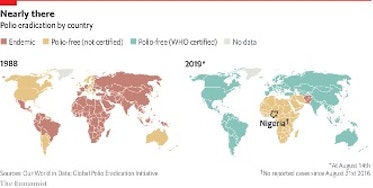

This incredible medical achievement is in large part due to the Rotary organisation who in the 1980s made a commitment to ending Polio. This has been done with significant support from Bill Gates and other philanthropists, such as Western Australia's own Andrew Forrest.
One of the greatest medical achievements ever - the eradication of polio - is playing out right now and has been driven by great humans of great character. Humans to admire and a reason for optimism.
Another great reason for optimism is the annual World's Greatest Shave in support of The Leukaemia Foundation. Unlike polio, cases of Blood Cancer are on the rise and in Australia it is now at more than 15,000 new cases per year or about 44 a day. But it has also brought out the best in people. In the last 22 years, the organisation has raised huge money and saved countless lives. They now have the ambition of 'Zero Lives Lost to Blood Cancer by 2035'. So while it may not be eradicated, successful treatment might be possible. This is a bold ambition but as they say, dare mighty things. Scotch is a big supporter of this ambition and over the years has raised significant funds. It is a great cause - well run and with a set goal. I encourage all of you to get behind it this year and support the Year 12s who will be shaving their heads on 30 March.
So, what's my point? It is rare that terrorists are truly freedom fighters and sometimes the honourable behave quite dishonourably but do not succumb to the darkness of cynicism. Celebrate the mighty achievement of completing the Bib Track, get involved in We Will Rock You, swim and run your hardest, head down to All Abilities Cricket or Disabled Surfing, smile and the world will smile with you and reach out the hand of kindness.

Opening Hours for Winter Uniform Changeover
No appointments are necessary. The Uniform Shop will be open extra hours over and above the normal opening times, as follows.
Summer Term Additional Opening Hours
Wednesday 1 April - 7.30am to 9.00am
Wednesday 8 April - 7.30am to 9.00am
Holiday Opening Hours
Friday 24 April - 9.00am to 4.00pm (lunch: noon – 1 pm)
Tuesday 28 April - 8.00am to 5.00pm
Autumn Term Additional Opening Hours
Wednesday 29 April - 7.30am to 9.00am
Boys need to be in winter uniform on Wednesday 29 April (start of term).
So often in the Performing Arts, we're asked the question about practice and preparation. How many times have we as educators, musicians, actors, practitioners, parents and as students of the art forms heard these sorts of lines uttered:
"Practice makes perfect".
Of course , in reality, we know this phrase to be completely untrue. Yet we also know, practice and preparation are two critical elements to seeing any sort of progress. Perhaps it would be more helpful to consider changing the phrase to:
"Practice makes progress".
When considering practice as a performing artist, practice should never be measured in minutes. Measuring practice in minutes won't set anyone up for success because the initial motivation is wrong. Everything one does in this session, seems like a chore.
From the minds of some of our faculty team, here are some hints for practice and preparation:
In a highly competitive environment, such as we see among boys, one of the most relatable quotes regarding practice comes from basketballer Ed Macauley:
"When you are not practicing, remember, someone somewhere is practicing, and when you meet him, he will win".
Scott Loveday
Head of Performing Arts

Miss Penny Hooper
Acting Head of Junior School
Safety is such an important part of school life and encompasses many areas. Whilst we want to promote healthy risk-taking, we also want to ensure that students can identify with their limitations and work within these, yet still attempt a challenge and have a go. We often call on those with expertise to help us when we embark on something new. As a school year begins, the boys are taking risks with some familiar challenges but there are also lots of new experiences which are stretching their boundaries and taking them into the unknown.
The Junior School has been a buzz of activity and whilst individual grade levels have enjoyed one or two events since the beginning of the year when your look across the school as a whole, there are a multitude of activities happening each and every week.
Examples of safety and risk taking can been seen across many of the classes in the Junior School. Bike and travel safety are a major focus for our Year 2 students. Madame Vinton has continued her Cycling Club and there have been some great lessons on safety learnt by this group. The younger students have been looking to their families for discussions on safety and how their family help keep them safe have been a part of this learning interaction. Globally, there is a great deal of discussion on safety and health which is extremely topical given the Coronavirus. The Year 3’s have taken action and are encouraging healthy handwashing routines and reminding students to cough into their sleeves as part of their interest in safety.
Mr Marginis has been working with students, staff and parents across the Junior School (Pre-Kindergarten to Year 5) about individual safety and how to identify key adults that form their safe network. This is part of a series of lessons on Child Protection that will run over Semester 1. Identification of safe and unsafe feelings, who to talk to, having a voice, knowing what parts of our body we are the boss of and ensuring that they are comfortable enough to assertively say ‘no’ are all parts of the lessons being run in the Junior School.
Coffee mornings with parents this term have outlined information about supporting the Child Safe Launch, Child Protective Behaviours and sharing ways in which parents can encourage their children to be confident and be in control of their own bodies. This is in line with the Commissioner of Children and Young People WA launch around child safety and the rights of children. Jon Marginis (JS Psychologist and Wellbeing Coordinator), James Hindle (Director of Staff and Student Wellbeing) and myself as Acting Head of Junior School share and update parents about JS student wellbeing, current information and the direction of Scotch initiatives in these coffee mornings with parents.
The Year 1 team have started with a BANG!
The boys have explored their newfound freedom on both the oval and the pirate ship playgrounds. Many games of soccer and adventures have been had so far. It’s so wonderful to see the enjoyment on their faces as they run, climb and slide!
We have settled into our daily structure with a balance of play and differentiated formal learning. The boys have loved having the responsibility of their own iPad device for learning. We have also developed an understanding of our routines and expectations when we are a Year 1 boy. The boys have been so proud wearing their summer uniforms with hair neat and tidy, shirts tucked in and shiny black shoes with laces tied.
Through our first unit of inquiry ‘Who we are’, we have focused on the central idea that ‘Relationships can shape the health and wellbeing of individuals’. We have explored how we develop friendships and how they affect us, what roles and behaviours are within our friendships and family and how we can maintain our relations. We have made friendship circles, family portraits and most recently we made our own terracotta friendship circles inspired by the traditional concept of Mexican Friendship Circles.
Our friendships in Year 1 are strong and evident in class and the playground. Some boys have been congratulating others on their achievements and success in class while others have been active in helping friends to reset their desk areas ready for the next lesson. We have seen many boys using the friendship tree in the playground and their friends come to ask them to play with them. It has been wonderful to hear and see the kindness coming out daily.
Our assembly item also reflected our unit of inquiry. We prepared and sang the wonderful song “We are going to be friends” by Jack Johnson. The boys sang so beautifully and looked so smart in their bright coloured shirts, sunglasses and hats. It was wonderful to share it with Dr O’Connell, Miss Hooper and Mrs Ritchie as well as all our friends and family in the Scotch community.
The Year 1 cohort have an abundance of enthusiasm and drive and with this, I know that they will have an exciting year of exploring, investigating and inquiring adventures. Look out – here we come!


Mrs Jayne Ricciardello
Year 1 Teacher
The Junior School boys have had a fabulously creative start to 2020. The boys are in the thick of inquiry-based music units and we are having lots of fun! The Year 1 boys have been exploring pitch and melody through movement, singing and playing songs on the glockenspiels; boys in Year 2 have just finished writing and performing their own rhythm compositions and are now considering creating their own musical notation; the Year 3 lads have been having fun picking the 'odd one out' by focusing on the placement of accents to determine whether music is in threes or fours; the Year 4 gents have been exploring 'feels' in music and the musical elements that help to characterise various genres; and Year 5 have just finished a task in which they carefully considered the process of learning and performing reggae rhythms in groups before transferring them onto instruments. I'm so impressed with the rich learning that has been taking place. Keep up the great effort, boys!
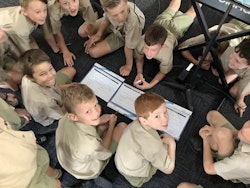
Miss Phebe Samson
Performing Arts Teacher
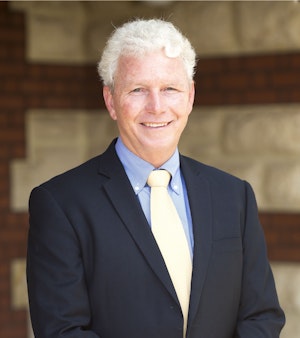
Mr Richard Ledger
Head of Middle School
At our last Middle School Assembly I spoke about loneliness. It is surprising to think in a school setting, where there is a hive of activity, play options and social interaction, that we can identify boys who are lonely. Boys who desire to be included but just can't find a way to break the ice, to make and sustain the first moves to make friends and be included. They are boys who need someone to help them out of the blocks and to run with them for a while.
The following is a heart-warming recount of a new boy, full of beans and socially engaged who was on his way to the canteen when he noticed another boy, a boy he hadn't met yet, sitting on his own eating his lunch by himself. So, instead of continuing on he stopped, came back and sat next to the boy and introduced himself. He found out he was in another grade and was new as well. They talked about the book he had on his lap. After a few minutes he said "I'm going to the canteen now but I'll return and if you're still here when I come back you can come and join me and my friends in our game." Five minutes later he was back, the boy was still there on his own, and true to his word he encouraged the boy to join in with him and his friends in their lunch time activity.

In Middle School we know the importance of positive relationships, friendships, and how they underpin confidence and in turn engagement and from there a fuller, more optimistic and enjoyable immersion in school life. We also know that social anxiety is real and comes in a range of debilitating degrees. What the above story so beautifully illustrates is how easy it is for us to reach out and include someone into our group, into our community.
This story occurred two weeks ago and I've since observed the lonely boy has found and made some friends. I am frequently in discussion about skills our students will need to make their way post school into a changing world. I still can't see anything that would displace the ability, and willingness, to smile and to be kind and inclusive to others.
Joining the Middle School comes with a lot of new opportunities for the Year 6 boys. Over the last few weeks, the boys have had the chance to explore and use the Middle School Science Labs for the very first time. After a little bit of orientation and discovery in the lab, it was time to get down to some Science.
They learnt about how matter moves between the three states of matter by observing water move between solid ice, liquid water and gaseous water vapour. Then they got the chance to experiment themselves. They mixed bi-carb soda and vinegar, melted chocolate with boiling water, watched food colouring interact with detergent in milk and mixed salt and cream together. This was all to discover the differences between reversible and irreversible changes.
Working in the labs, with lab coats and safety goggles on is certainly one of the most anticipated events early in Year 6.
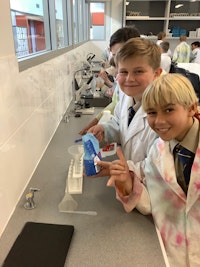
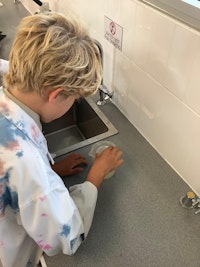

Mr Peter Gaspar
6.3 Homeroom Teacher
The boys of 8.2 have come together this year with fresh enthusiasm and open minds to the Community Project.
Students of 8.2 and 8.4 have blended to create groups for the Community Project. In their first meeting the boys worked together to define group rules, identified personal strengths and weaknesses and started to brainstorm ideas for their service action.
It was heart-warming to see the new groups communicate warmly and respectfully with one another. Even though the boys have some experience with each other because most have shared the Year 7 journey, boys also learnt new things about one another. Branching out to get to know others and to find common interests is one of the valuable benefits of the Community Project.
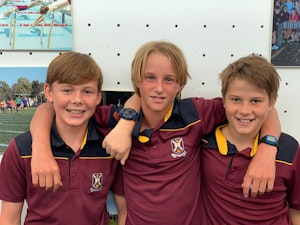
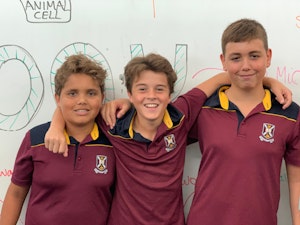
This is the beginning of a 6 month long group project and it augers well that the boys are keen to get started and are communicating effectively in the early days. We wish all of the boys the very best and hope they enjoy delivering some meaningful community service action this year.
Ms Gabriel Hodgson
8.2 Homeroom Teacher
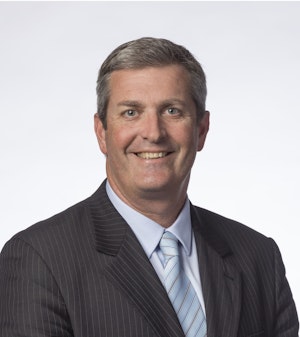
Mr Peter Burt
Head of Senior School
For those Survivor fans, the Australian All Stars season is approaching the pointy end. The "outwit, outplay, outlast" mindset of the remaining individuals is coming to the fore. While it is just another reality TV show and obviously edited to create drama, intrigue, heroes and villains, it can be entertaining!
Castaways talk about playing a "social game" or a "physical game". Some are good at puzzles and others are good at manipulating situations, reading people and trying to survive, in order to make it to the end. Although it is just a game meant as light entertainment, there are aspects that are intriguing, that draw us in and keep us watching. People are doing all they can to "win", but what starts as 24 ends up with just one winner, in other words 23 people don't win. Something one of the Castaways said poignantly just before he was eliminated, was: " Failure gives you another opportunity."
That contestant, Matt Rogers has played both Rugby League and Rugby Union for Australia and throughout his competitive career, he faced many challenges and overcame setbacks and "failures". This ability to overcome failures is a secret to our growth as an individual, or as a group or community. It is dependent on our mindset, our willingness to learn and re-invent, our passion, creativity, perseverance and enthusiasm. It is an opportunity to begin again, this time with more experience and knowledge.
There is often a focus on famous people who have overcome setbacks, or "failures" in their lives to have remarkable success; people like Michael Jordan, Steve Jobs, Alexander Fleming and Vincent van Gogh to name a few. They have experienced incredible achievements in their various fields of sport, business, science and the arts, but their success took time. They made errors and learnt from them – the errors provided the opportunity for them to learn and improve and were the catalyst for their success.
Like these individuals, some people aspire to reach the top of the field about which they are passionate. However, learning from our mistakes and looking for that opportunity can be beneficial for all of us. It might be in how we prepare for a test, how we interact with our peers, it might be an error in technique in a sporting situation, a lack of concentration during a musical performance or a poorly worded argument in a debate. The opportunity exists for all of us to learn from our mistakes, to improve, to try something different, to be resilient and to surprise ourselves. We won't achieve success with every adjustment we make, but the willingness to try to see things from another perspective when they don't go to plan is important. This gives us a chance to reflect on our strengths, be mindful of our bias and be courageous enough to try again. We all get it wrong from time to time, that is part of life and the opportunity arises from how we choose to respond.
Please see below the final placings and points along with notable achievements by Scotch College swimmers.
Placed |
School |
Points |
|
First |
Christ Church |
1131.5 |
|
Second |
Hale School |
853 |
|
Third |
Scotch College |
820 |
|
Fourth |
Trinity College |
806 |
|
Fifth |
Wesley College |
708 |
|
Sixth |
Aquinas College |
683.5 |
|
Seventh |
Guildford Grammar |
380 |
Daniel Boshart (Year 9, Alexander) broke the school U16 100m Freestyle record in a time of 56.73.
Nicolas Le Page (Year 11, Anderson) broke the school U17 100m Freestyle record in a time of 55.82 and the school record for 50m Backstroke in a time of 29.19 (in the first leg of the Medley relay).
Ruan van der Riet (Year 11 Ross) broke the school and PSA record in the U17 50m Butterfly with a time of 26.09.
Ruan and Nicolas, along with Declan Cook (Year 11 Brisbane) and Macsen Friday (Year 11 Alexander) combined to break the PSA record for the U17 Medley Relay Team.
Xavier Smith (Year 7 David) broke his own school record in the U13 50m Freestyle in a time of 27.53. This time was also quicker than the previous PSA record, but another swimmer broke it in the same event. Xavier also broke his own school records in the U13 50m Breaststroke in a time of 35.89 and in the U13 Backstroke in a time of 34.29.
Medicine Info Session
Sunday 22 March - 12:45pm for a 1.00pm presentation
Interested in studying Medicine at Australia's leading university for Medicine? Find out all you need to know about Notre Dame’s Doctor of Medicine and Pre-Medicine Certificate programs including how to apply and important dates. You will also hear from current students and take a tour of our School of Medicine's facilities.
School of Medicine (ND35), The University of Notre Dame Australia, 38/40 Henry St, Fremantle
Find out more and register today at https://www.notredame.edu.au/events
18 March 2020 - Business Open Night
A Murdoch degree is where business, commerce and entrepreneurship intersect with politics, security and sustainability. These courses will kickstart your career - whether that's starting your own business, helping corporations become more sustainable, or working to minimise threats to our security.
1 April 2020 - Humanities and Social Sciences Open Night
A Murdoch Arts degree can help you to make a real difference to communities around the world. Murdoch boasts extensive internship opportunities, a new Global Security course and a selection of successful Alumni contacts which will transform you into a skilled communicator and creative thinker.
For more information and to register: https://www.eventbrite.com.au/e/humanities-social-sciences-open-night-tickets-91967648713?aff=EVP
Course Information Evening: Year 10-12 students
Monday 30 March 2020
4.30pm – 6.00pm: Interactive faculty course expo – speak directly to faculty specialists, academic teaching staff and current students.
6.00pm – 8.00pm: Information presentation, followed by presentations from each faculty.
Bookings at: https://alumni.uwa.edu.au/events/2020-course-information-evening
During the upcoming school holidays, UWA will be holding Individual Advisory Sessions for Year 12 students on 15-16 April and for Year 10 - 11 students on 22-23 April. This is the opportunity to ask questions and learn more about:
Bookings are essential due to a limited number of sessions. Parents/guardians are welcome to attend.
https://alumni.uwa.edu.au/events/2020-04-year-12-ias
https://alumni.uwa.edu.au/events/2020-04-year-10-11-ias
UCAT (University Clinical Aptitude Test) is required for all Year 12 students who are considering studying Medicine in 2021
To make your registration as easy as possible, click the button below for:
https://www.icanmed.com.au/ucat-registration-guide
University of Western Australia Fogarty Foundation Scholarship
Applications are now open for this prestigious award which has been established to provide senior secondary students with an opportunity to undertake a cycle 1 undergraduate degree course and then a cycle 2 postgraduate degree by coursework at the University. The scholarship is intended for students who show significant academic potential, together with leadership ability and other outstanding achievements throughout Year 11 and 12.
Closing date: 25 May 2020 for Year 12 students commencing in 2021.
Every year, the ANU offers 25 students from around Australia a scholarship of over $21,000 per year for up to five years of undergraduate study. The Tuckwell Scholarship is one of Australia’s most valuable scholarships, both monetarily, and in terms of the support and opportunities offered to scholars whilst at the ANU.
Visit https://tuckwell.anu.edu.au/apply for more information about the application process and how to apply.
Are you a young person and enjoy agricultural technology? The farm mechanisation industry needs you!
Make a 3 day investment in your future by joining the WA FARMERS BOOTCAMP TO EMPLOYMENT AT MURESK.
What will you do at WA Farmers Bootcamp?
Fly a drone
Operate precision control technology
Learn about machinery application for agronomy
Apply data based decision making
Kick start your career
Obtain a graded skills passport
Hear from Ag machinery and precision agriculture experts
Pitch to employers looking to employ apprentices and trainees
Program fee includes accommodation and meals. Spaces are limited – apply at dtwd.wa.gov.au/ mureskinstitute
Tuition for all students Year 7 - 12
Week One: 13 - 17 April at Christ Church Grammar School
Week Two: 20 -24 April at Hale School and Methodist Ladies' College
The April School Holiday Program offers students comprehensive subject revision and prepares students for their First Semester Exams.
Enrol at www.mastermindaustralia.com.au
An ADF Gap Year is a unique opportunity to experience life in the Navy, Army or Air Force, without needing to make a long-term commitment. The skills obtained through the ADF Gap Year program will provide you with valuable work and life experience and are completely transferable. It will enable you to develop the confidence for your next endeavour.
Students who take part in the ADF Gap Year program:
Whatever your interest, there are a variety of roles to select that will provide young Australians valuable life skills. These include experiences as an officer, in management, engineering, logistics and warehousing, combat and security, and administration.
Mr Peter Frusher
Careers Advisor
Our Year 9 Parents and House Heads enjoyed a lovely evening at the Parent and House Head dinner on Tuesday, 3 March. This is always such a great opportunity for our Year 9 parents to meet their boys House Head, who will navigate and mentor them throughout their senior school journey. I have received fantastic feedback from many parents so a huge thank you to Heather Cowan and her team of helpers who successfully put together an amazing event, as well as Mr Peter Burt and the House Heads.
The next Scotch Parents meeting was scheduled for Wednesday evening 18 March, however the Scotch Parents' have also made the decision to cancel all meetings and social gatherings for the remainder of the term, in line with the college policy of ensuring social responsibility regarding the COVID-19 situation.
We thank you for your understanding.
Upcoming cancelled events supported by Scotch Parents…
Year 9 Coffee Morning – Tuesday 17 March, Mel and Co Café – 8.30am - Cancelled
Year 11 Family BBQ – Sunday 22 March, Chidley Point Reserve – 11.00am - Cancelled
Year 10 Coffee Morning – Thursday 9 April, The Lakeside – 9.00am - Cancelled
Ms Kate Reynolds
President
Scotch Parents